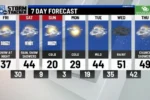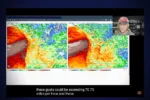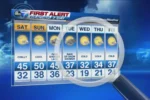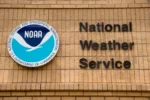Get ready, because this weekend is going to be an exciting weather adventure for Northern New Jersey! On Saturday afternoon, you might see fluffy white snowflakes falling from the sky, with up to 4 inches expected before it turns into rain. But hold on, because on Sunday, the snow will melt into heavy rain, bringing up to 2 inches of water. This is important because it could cause flooding in some areas. Let’s dive into what this means for your weekend plans and how to stay safe during these winter storms!
| Weather Condition | Expected Snow (inches) | Transition to Rain | Expected Rain (inches) | Flooding Concerns |
|---|---|---|---|---|
| Northern New Jersey | 2 to 4 | Yes, transitioning to rain | Possibly 2 | Yes, possible flooding |
Snowy Saturday in Northern New Jersey
On Saturday afternoon and evening, Northern New Jersey is bracing for a snowfall of 2 to 4 inches. This cold weather is expected to blanket the area, making it a winter wonderland for a little while. Children may enjoy snowball fights and building snowmen, all while parents prepare for the shift to rain later in the weekend. It’s important to stay safe and warm as the snowfall could create slippery roads.
As the snow begins to accumulate, residents should be cautious while driving and walking outside. The National Weather Service has warned that the winter weather could impact travel plans, especially in the I-95 corridor. Staying informed about the weather conditions and updates can help everyone stay safe during this snowy Saturday. So grab your mittens and enjoy the beauty of winter while it lasts!
Rainy Sunday and Flood Concerns
On Sunday, the weather is set to change dramatically as temperatures rise and heavy rainfall takes over. The snow from Saturday will start melting, and the rain could amount to 2 inches, leading to potential flooding in some areas. It’s crucial for families to stay alert and prepared for these changes. Keeping an eye on local weather reports can help everyone stay informed about the conditions.
Flooding can be dangerous, so it’s important to avoid walking or driving through flooded areas. Parents should talk to their kids about why it’s risky to play in heavy rain or near flooded streets. Making sure everyone knows how to stay safe during rainy days can help prevent accidents. Planning indoor activities can also make a rainy Sunday enjoyable despite the weather challenges.
Understanding the Snow Transition to Rain
As northern New Jersey braces for a notable winter storm this Saturday, residents should prepare for a mix of snow and rain. The forecast indicates that 2 to 4 inches of snow will blanket the area before the temperatures rise, leading to a transition into rainfall. This shift highlights the dynamic nature of winter weather, where a sudden influx of warm air can drastically alter precipitation types and impact daily activities.
Understanding this transition is crucial for planning. The accumulation of snow can create hazardous travel conditions, especially in the early hours of Saturday. As temperatures climb, the snow will begin to melt, adding to the rain that will follow. This dual-weather event may create challenges for local municipalities as they manage both snow removal and drainage systems to prevent flooding.
Implications of Heavy Rainfall and Flooding Concerns
On Sunday, northern New Jersey is expected to face heavy rainfall, with totals potentially reaching 2 inches. This significant amount of rain, combined with the melting snow, raises serious concerns about flooding in vulnerable areas. Understanding the implications of such weather patterns is essential for residents, especially those in flood-prone regions. Being informed and prepared can make a substantial difference in ensuring safety during these extreme weather events.
Flooding can disrupt daily life, damage property, and pose safety risks. It’s important for residents to monitor local alerts and heed warnings from the National Weather Service. Simple precautions like avoiding flooded roadways and securing outdoor belongings can mitigate risks. Additionally, local authorities may implement measures such as temporary road closures or sandbag stations to help manage potential flooding. Staying informed and proactive is key.
Weather Preparedness for Winter Storms
With winter storms becoming more frequent, preparing for adverse weather conditions has never been more critical. Residents of northern New Jersey should stock up on essentials like food, water, and medications ahead of the storm. Additionally, ensuring that your heating systems are functional can help maintain a safe environment during the cold weather. Having an emergency kit that includes flashlights, batteries, and a first-aid kit can also be beneficial.
Moreover, staying connected to reliable weather updates is essential. Following local news channels and weather apps can provide real-time information on changing conditions. Businesses and schools should have contingency plans to address potential closures due to snow or flooding. By prioritizing preparedness, residents can minimize the impact of winter storms on their lives and ensure a quicker recovery post-event.
Navigating Winter Travel Challenges
Traveling during winter storms can be treacherous, especially with the anticipated snow and subsequent rain in northern New Jersey. It’s essential for drivers to exercise caution during these conditions. Before heading out, checking road conditions and weather forecasts can help determine if travel is necessary. If travel is unavoidable, ensuring your vehicle is winter-ready with proper tires and emergency supplies can enhance safety.
Additionally, adjusting driving habits is crucial during winter weather. Reducing speed, increasing following distances, and being aware of potential black ice can significantly reduce the risk of accidents. Many local authorities will issue travel advisories or restrictions during severe weather, and adhering to these guidelines is vital for personal safety and the safety of others on the road.
Frequently Asked Questions
What is snow and how does it form?
**Snow** is frozen water that falls from clouds. It forms when temperatures are very cold, causing water vapor to turn into tiny ice crystals that stick together.
Why does Northern New Jersey get so much snow in winter?
Northern New Jersey gets **lots of snow** because it’s near cold air from Canada and warm air from the ocean. When they meet, it creates the right conditions for snow to fall.
What happens when snow melts and turns into rain?
When **snow melts**, it changes into **water** as temperatures rise. This water can flow into rivers and lakes, helping the environment but also sometimes causing **flooding**.
What are the dangers of heavy rainfall after snow?
Heavy rainfall after snow can lead to **flooding**. This happens when too much water falls too fast, overwhelming rivers and streets, making them dangerous.
How can we prepare for a winter storm with snow and rain?
To prepare for a winter storm, you should:
– **Stay indoors** during the storm.
– Have **emergency supplies** like food and water.
– Keep a flashlight and batteries ready.
What is the I-95 corridor and why is it important for weather?
The **I-95 corridor** is a major highway area that runs along the East Coast. It’s important for weather because it connects many cities that can experience similar snow and rain conditions.
How does weather forecasting help us during storms?
**Weather forecasting** helps us by predicting storms. This way, people can prepare for bad weather, stay safe, and know when to expect snow or rain.
Summary
The content discusses the upcoming winter weather in Northern New Jersey, predicting 2 to 4 inches of snow on Saturday afternoon and evening. This snowfall is expected to transition into heavy rain on Sunday, with temperatures rising and total rainfall potentially reaching 2 inches. The National Weather Service notes that sufficient cold air will be present initially, which may lead to significant snowfall impacting areas as far south as the I-95 corridor. The forecast raises concerns about possible flooding due to the expected heavy rainfall following the snow.







